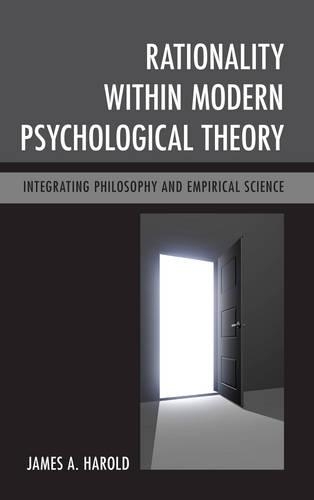
Rationality within Modern Psychological Theory: Integrating Philosophy and Empirical Science
(Hardback)
Publishing Details
Rationality within Modern Psychological Theory: Integrating Philosophy and Empirical Science
By (Author) James A. Harold
Bloomsbury Publishing PLC
Lexington Books
15th June 2016
United States
Classifications
Professional and Scholarly
Non Fiction
Philosophy
150.1
Physical Properties
Hardback
206
Width 157mm, Height 236mm, Spine 21mm
490g
Description
Rationality within Modern Psychological Theory examines the rational and irrational dimensions of human nature and of the psyche and logos. Harold combines the traditionally divided views of classical philosophys affirmation of the existence of intellect and modern psychologys emphasis on immanent psychological factors over rational, transcendent relations. By accepting the power of being in an adequate relation to reality, while still admitting the manifold ways that people evade truth and reality, psychologists will be able to emphasize the power of an individual to establish a truthful relation with reality. This book is recommended for scholars of psychology and philosophy.
Reviews
How we need interdisciplinary studies in our era where specialization easily leads to narrow-mindedness! Particularly, this can be so when many philosophers lack a knowledge of sound psychology and many psychologists lack a knowledge of sound philosophy. James Harolds book, Rationality within Modern Psychological Theory: Integrating Philosophy and Empirical Science, is a masterful synthesis to overcome this syndrome. Academic enough to appeal to other professors, it is written in a style sufficiently popular to make it an ideal textbook for university students as well as for all other intelligent readers. -- Ronda Chervin, Holy Apostles College and Seminary
What does it mean to be a human person This is essentially and above all a philosophical question. And so psychology as an empirical-natural science, while it can tell us a lot about the human person, cannot tell us everything, and not the most important things. We need to broaden out and expand the reach of psychology through philosophy. Here is a book that does this, a wonderful blending of psychology and philosophy by bringing the two disciplines into a fruitful and harmonious relationship with each other. A must-read for anyone interested in what it means to be a human person, a book for both psychologists and philosophers. -- Stephen D. Schwarz, University of Rhode Island
Rationality within Modern Psychological Theory fully deserves careful study: Harold shows convincingly that besides many empirical methods and parts of psychology, there are important areas of this discipline that are based on logos and akin to philosophy, or even philosophical in nature. To the degree the authors many profound yet simple and accessible insights will be accepted and integrated in psychology, one can expect a significant reform of the field: A logos-based psychology that contributes to a true understanding of happiness and acknowledges that a person can only be happy to the extent he loves and is loved. Harold sees the culmination of this fulfillment and happiness in a saint, who reaches authentic happiness, however atrocious his sufferings or martyrdom may be. -- Josef M. Seifert, International Academy of PhilosophyInstituto de Filosofa Edith Stein (IAP-IFES)
Author Bio
James Harold is professor of philosophy at Franciscan University of Steubenville.
